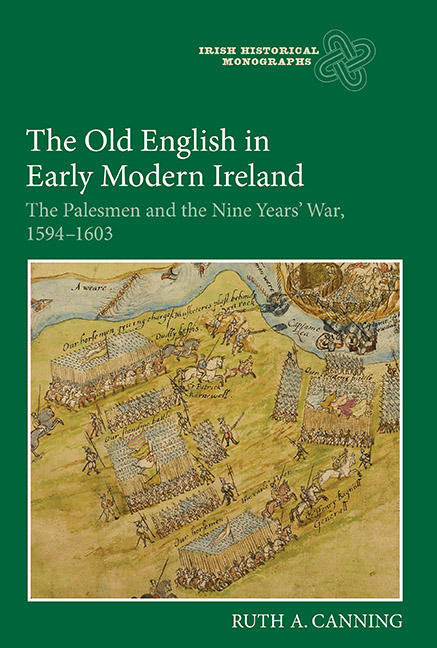Book contents
- Frontmatter
- Dedication
- Contents
- Acknowledgements
- Note on Conventions
- Abbreviations
- 1 Pale Politics: An Old English Community and the Outbreak of War
- 2 Instruments of Sedition: Priests and the Pale
- 3 Secret Traitors and Crown Colluders: The Palesmen's Response to Patriotic Pressures
- 4 ‘Patriot Games’: Old English Participation in the Crown's Military Enterprise
- 5 ‘Road to Perdition’: The Socio-Economic Impact of War on the Pale
- 6 Office and Influence: Defending a Tradition of Privilege
- Epilogue: An Inconclusive Aftermath
- Bibliography
- Index
- Irish Historical Monographs Previous Volumes
1 - Pale Politics: An Old English Community and the Outbreak of War
Published online by Cambridge University Press: 07 September 2019
- Frontmatter
- Dedication
- Contents
- Acknowledgements
- Note on Conventions
- Abbreviations
- 1 Pale Politics: An Old English Community and the Outbreak of War
- 2 Instruments of Sedition: Priests and the Pale
- 3 Secret Traitors and Crown Colluders: The Palesmen's Response to Patriotic Pressures
- 4 ‘Patriot Games’: Old English Participation in the Crown's Military Enterprise
- 5 ‘Road to Perdition’: The Socio-Economic Impact of War on the Pale
- 6 Office and Influence: Defending a Tradition of Privilege
- Epilogue: An Inconclusive Aftermath
- Bibliography
- Index
- Irish Historical Monographs Previous Volumes
Summary
In autumn 1599 Hugh O'Neill, earl of Tyrone and leader of the Irish Catholic Confederacy, aimed to penetrate the loyal English Pale through County Westmeath. This presented an immediate threat to crown defences in the area, as well as to the man in charge of them, Christopher Nugent, the baron of Delvin. As the rebels approached, Delvin hastily wrote to the Council in Dublin: ‘I mistrust a great part of the country will revolt, some according their own lewd disposition… and others in respect [that] they have no defence.’ Delvin's fears were well founded: five years of war had taken its toll on his barony, and now that O'Neill's incursions coincided with the harvest, many of Delvin's tenants and neighbours were inclined to submit. The reality was that as the war had dragged on and O'Neill's strength continued to grow, it had become increasingly difficult for border lords like Delvin to maintain their defences. And now this danger coincided with the deployment of a sophisticated nationalist rhetoric which called upon all Irish Catholics to defend their homeland from the centralising forces of the English Protestant crown. This could be strong incentive and justification for any vacillating borderer or haggard husbandman, and a number of formerly loyal Old Englishmen did switch sides. Surrounded by the forces of O'Neill, O'Rourke, and their Leinster allies, ‘the whole country being on fire’, Delvin assured the Dublin Council that his own doubts were never about whether he would remain loyal to the queen; rather, he doubted his ability to withstand further rebel incursions without military assistance from the crown. Delvin begged administrators for reinforcements to defend this vital frontier, but his pleas were ignored; he begged for directions – should he make a stand, or run and fight another day – but little sympathy or instruction was forthcoming. Finally, the desperate Delvin, ‘subject to all adventures of fortune, in a weak house, not possible long to be kept’, requested permission to parley with the wily O'Neill in the hope of gaining some time to regroup. The lord lieutenant, Thomas Butler, earl of Ormond, reluctantly agreed, and Delvin, through his agents, entered a series of discussions with the Confederate leader and achieved a temporary truce.
- Type
- Chapter
- Information
- The Old English in Early Modern IrelandThe Palesmen and the Nine Years’ War, 1594–1603, pp. 1 - 13Publisher: Boydell & BrewerPrint publication year: 2019



